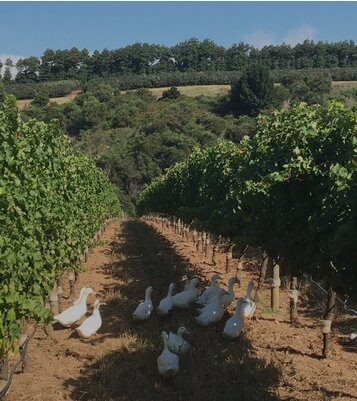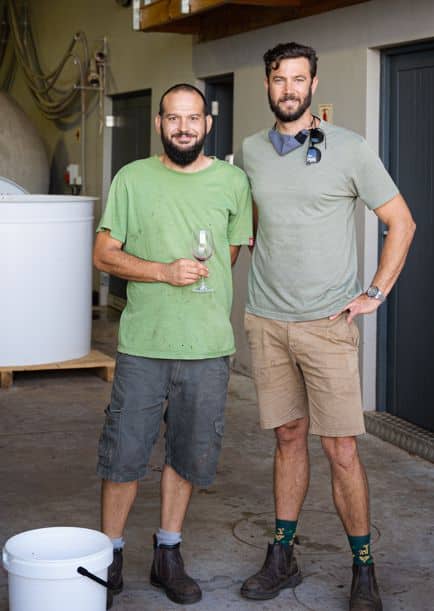Tim James: Organic wine farming in Elgin
By Tim James, WineMag, 7 March 2022

South Africa lost one of its only two certified biodynamic producers (the other being Reyneke) when Radford Dale bought Elgin Ridge late last year. A few biodynamic practices will continue in some form, however – notably the composting programme from farm inputs, including chicken manure. Ducks are always delightful additions and they’ll play an increasing part, helping to keep down snails, but the sheep and cattle are no more. The farm’s certified organic farming and winemaking will persist. It was one of the great attractions of the place to Alex Dale and his team that the vines had been organically farmed from the start – rather than being converted - when ex-Londoners Brian and Marion Smith started turning an apple farm over to vineyards after buying it in 2007.
The property, now called Radford Dale Organic, is in a particularly pretty part of Elgin, it struck me when I visited last week (though when I mentioned this I was told that all of Elgin is pretty!). Lots of usefully varied slopes as well as charming vistas. It’s down Appletiser Road, an name that would suffice to remind one of the fruit that dominates the local economy even if the ubiquitous apple orchards didn’t do so even more emphatically. It was lucky for the Cape wine industry that the local apple business went though a slump for long enough to allow grapes a plausible foothold – we’d be much the poorer without Elgin wine.
Radford Dale, based in Stellenbosch but up till now with no vineyards of its own and buying in fruit widely, is no stranger to Elgin grapes. “We’d explored the wine regions enough to know where we wanted to be”, says cellarmaster Jacques de Klerk. So the momentous decision to take this 20-ha farm, with something over six hectares of established vineyard, came with experience of the cooler climate, along with long wanting to expand and deepen RD’s work with organic fruit, complementing the established minimalistic winemaking. (See the website for more.) In fact, says Jacques, contact with the Smiths, leading eventually to the purchase, began when he came looking for organic pinot noir – something of a rarity, though an important one for Radford Dale, given that pinot is a growing category for them.

So, while the deal was being finalised, the new owners started work on the farm last June, in time for pruning. The eminent Kevin Watt will stay on as viticultural consultant. Gerhard Joubert, who’d been working with Jacques in the Stellenbosch winery for some eight years, is in charge of the organic cellar here and is also farm manager. Together they will oversee the Radford Dale Organic planting programme in Elgin. Scheduled to go into the ground over the next few years are more pinot and chardonnay – and gamay, which has already become something of a specialty for RD. Those will amount to two hectares. After that, further plans for the available land will emerge. Incidentally, the sauvignon blanc grapes that were central to the Elgin Ridge output will all be sold off – it’s not a grape used in the already quite extensive RD range. There is some fairly young cabernet franc that a few vintages have been made from, and they should be promising when a bit older.
The new owners will also be developing the visitor side of things. While most of the RD wines, including the Winery of Good Hope and Land of Hope ranges, will continue to be made at the rented Stellenbosch cellar, this will become the brand home, with a tasting room (there’s a glass wall looking down into the winery) being developed as the first step.
Two 2021 wines in the emerging Radford Dale Organic range were made from grapes grown on the farm – before the purchase, so they were vinified in the small organic cellar at the Stellenbosch HQ. I tasted them last week, together with the first wine in that range, a once-off small bottling of Chenin Blanc 2020 from Stellenbosch – characterful and pleasing, fresh and rather salty-earthy. The two new wines, bottled but unlabelled as yet, are due for release later this year.
The Radford Dale Organic Chardonnay 2021 is also fresh, but rather more elegant, with a light – perhaps a touch too light for my taste – finesse at 11.5% alcohol. Last year and this one must count as “learning years”, the team admits, and while this wine is undoubtedly a good wine, with a fine inherent structure, Gerhard thinks the 2022, picked a little riper, will have a bit more useful richness and flavour.
There’s no need to nitpick about the Freedom Pinot Noir – a well-established wine, but from 2021 entirely from these vineyards and coming under the Radford Dale Organic label. And, of course, from the 2022 vintage it is made in the Elgin cellar. It’s a few years since I’ve tasted the Freedom Pinot, but this seemed to me to have a new charm to it as well as a degree of austerity – and youthful charm is perhaps something more easily associated with pinots from the Hemel-en-Aarde than Elgin. Whole-berry fermentation is something that helps with this, says the winemaker. This is already a rather delicious wine, with a succulence as well as a fresh elegance.
“Organic pinot”, says Jacques, “when its well made, is always going to be a cut above.” Perhaps he’s right. There seems much to look forward to from organic Elgin winegrowing.
- Tim James is one of South Africa’s leading wine commentators, contributing to various local and international wine publications. He is a taster (and associate editor) for Platter’s. His book Wines of South Africa – Tradition and Revolution appeared in 2013.






